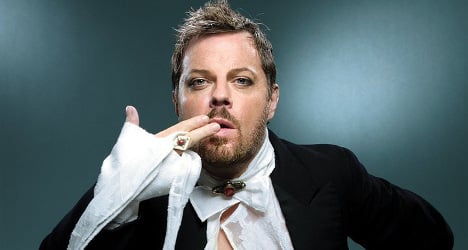On the final night of his ground-breaking mini-tour of France (in French), English stand-up comedian Eddie Izzard brought an enraptured Parisian audience with him on a journey through space and time – from the beginning of the universe to a meeting on the moon between Neil Armstrong, Darth Vader and God.
Izzard, in jeans, black coat-tails, and his trademark deep red nail polish, explored common ground like iTunes contracts (“Did it take God millions of years to create us because he was reading the terms and conditions?”), Wikipedia, and his usual surreal sidebars – a section about a velociraptor caught speeding in a Renault Mégane brought parts of the audience to tears.
The biggest belly-laughs, though, came from some home truths about the French themselves.
A vast conspiracy among French restaurant-owners to hide all vegetables from tourists (except for haricots verts), and a mafiosi network of French pharmacies got a great response, but a section about that old British bug-bear, French toilets, sent the trendy but buzzing crowd into rapturous applause.
“You've had the French Revolution! The aristocracy – gone, all the prisoners in the Bastille – free! Everything in French society changed. The toilets? Exactly the f**king same.”
For all his fantastic absurdism, however, Izzard also lives in the real world of politics and religion, and hit a couple of nerves with a piece about Pope Benedict retiring into vice-ridden debauchery, and a fleeting comparison between the Nazis and France’s far-right National Front party.
Izzard also got a sustained roar of appreciation after pointing out he had just perfectly used the subjunctive mood in French, and suggested that, 1,000 years after William the Conqueror, his ample use of the word ‘f**king’ amid French phrases, was an “entente cordiale – a bridge” between the French and British cultures.
Having taken the audience through the Creation, Noah’s Ark, and the Ancient Greeks, Izzard tied together the loose ends in a dazzling climax, where Roman centurions try to communicate with each other in a kind of Tower of Babel battle-scene.
Izzard flew between Latin, French, English, Spanish, Italian and German – a brilliant, chaotic way to hammer home his parting message: “We are all totally the same, and completely different, at the exact same time.”
After the sold-out show, Izzard (still speaking French) told The Local “It was emotional for me. L’Olympia is such a great venue, with so much history. It’s been a dream of mine for years to do this tour, and now I’ve realized it.”
Next up for Izzard is another piece of history – his ‘Force Majeure’ world tour this spring and summer will take him to the UK, German, Sweden, Norway, Switzerland, Russia , India and beyond.
Unwinding in his dressing-room, glass of white wine in hand, Izzard told The Local, with a smile: “I won’t stop now. I can’t stop.”




 Please whitelist us to continue reading.
Please whitelist us to continue reading.
Member comments